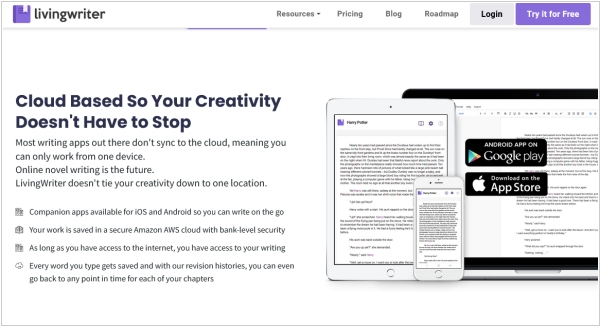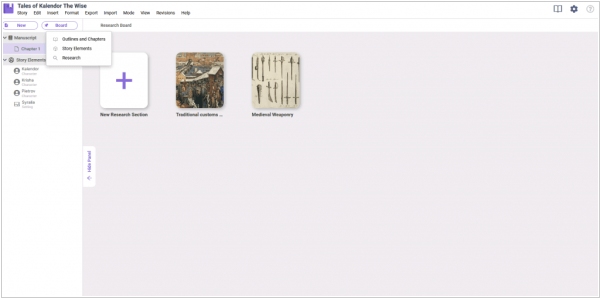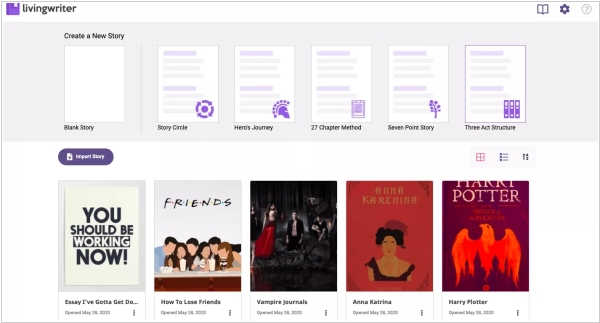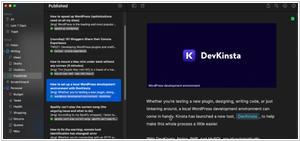Livingwriter vs Ulysses
Last updated: July 12, 2023
LivingWriter and Ulysses are two distinct writing software options that offer different features and approaches to writing.
LivingWriter is a cloud-based writing tool that prioritizes collaboration and organization. It provides a user-friendly interface and features designed for collaborative writing projects. LivingWriter allows multiple authors to work on the same document simultaneously, making it ideal for co-authors or writing teams. It offers tools for outlining, storyboarding, character development, and progress tracking. Additionally, LivingWriter integrates with popular productivity tools like Google Docs and Microsoft Word. Its emphasis on collaboration and organization makes it a suitable choice for authors who value real-time collaboration and streamlined project management.
Ulysses, on the other hand, is a writing software known for its simplicity and focus on distraction-free writing. It offers a clean and minimalist interface that allows authors to concentrate solely on their writing. Ulysses provides a powerful writing environment with features like a customizable writing interface, markdown support, and a unified library for organizing and managing writing projects. It offers seamless syncing across multiple devices, making it convenient for writers who work on different platforms. Ulysses' simplicity and distraction-free approach make it popular among writers who want to focus solely on the writing process without additional features or collaboration tools.
Another significant difference between LivingWriter and Ulysses is their platform compatibility. LivingWriter is a cloud-based tool accessible through a web browser, allowing users to access and work on their writing from any device with an internet connection. It offers the convenience of cloud storage and real-time collaboration across platforms. Ulysses, on the other hand, is a standalone writing software available for Mac, iPhone, and iPad. It provides a seamless writing experience within the Apple ecosystem and offers synchronization through iCloud. Ulysses' platform-specific nature may be preferable for writers who prefer a dedicated writing app and are primarily within the Apple ecosystem.
LivingWriter is a cloud-based writing tool that prioritizes collaboration and organization. It provides a user-friendly interface and features designed for collaborative writing projects. LivingWriter allows multiple authors to work on the same document simultaneously, making it ideal for co-authors or writing teams. It offers tools for outlining, storyboarding, character development, and progress tracking. Additionally, LivingWriter integrates with popular productivity tools like Google Docs and Microsoft Word. Its emphasis on collaboration and organization makes it a suitable choice for authors who value real-time collaboration and streamlined project management.
Ulysses, on the other hand, is a writing software known for its simplicity and focus on distraction-free writing. It offers a clean and minimalist interface that allows authors to concentrate solely on their writing. Ulysses provides a powerful writing environment with features like a customizable writing interface, markdown support, and a unified library for organizing and managing writing projects. It offers seamless syncing across multiple devices, making it convenient for writers who work on different platforms. Ulysses' simplicity and distraction-free approach make it popular among writers who want to focus solely on the writing process without additional features or collaboration tools.
Another significant difference between LivingWriter and Ulysses is their platform compatibility. LivingWriter is a cloud-based tool accessible through a web browser, allowing users to access and work on their writing from any device with an internet connection. It offers the convenience of cloud storage and real-time collaboration across platforms. Ulysses, on the other hand, is a standalone writing software available for Mac, iPhone, and iPad. It provides a seamless writing experience within the Apple ecosystem and offers synchronization through iCloud. Ulysses' platform-specific nature may be preferable for writers who prefer a dedicated writing app and are primarily within the Apple ecosystem.
63
LivingWriter is book writing software designed for fiction authors. It features a standard word processor alongside a suite of planning and plotting features.
13
The Ultimate Writing App for Mac, iPad and iPhone. Powerful features and a pleasant, focused writing experience combined in one tool, made for people who love to write and write a lot
Livingwriter vs Ulysses in our news:
2022. LivingWriter brings its mobile apps in line with our web/desktop versions

LivingWriter mobile app for iOS/Android was created as a companion app for quick on-the-go writing, so it’s missing quite a few features available on our web/desktop versions. But with new upgrade, the mobile app will be updated to include ALL the features of our web/desktop versions. The new version also includes a fresh new (but not unfamiliar) design with the latest UI/UX technology and a zippier interface, in addition to various customization options. Added layers of security like 2FA and password locks on stories/folders are coming soon. With more export options added and the ability to produce Kindle-Ready and KDP formatted files. The new Device Preview feature will allow you to see your book across multiple devices. Along with this, LivingWriter has also redesigned sharing feature with tools such as tracking changes, live collaboration, live commenting, and more.
2021. LivingWriter has introduced the Research Board

LivingWriter's newest feature, the Research Board, serves as a tool to research important matters related to a story. For instance, it could be used to research cultural characteristics of a particular region, political and economic structures of a feudal society for a medieval fantasy novel, and other related research. The Research Board provides a separate space for writers to work on their research, eliminating the need to use general-purpose features like Story notes or Global notes, or even a separate notebook or app, especially when working on research-intensive projects like a Ph.D. thesis. The Research Board allows writers to add and organize their research neatly within the app.
2020. LivingWriter now allows to set writing goals for your story

LivingWriter has unveiled a new feature called Writing Goals that allows users to set word count targets for individual chapters or the entire story. By establishing a deadline for completing the story or chapter, LivingWriter automatically computes the daily word goal required to achieve the ultimate target. Users can also take days off, and the program will distribute the daily word count evenly over their writing days. This feature is particularly beneficial for those with deadlines such as the National Novel Writing Month competition, which requires participants to finish their novels in a month. However, even if there is no deadline, setting goals is still critical for personal progress.
2020. Livingwriter now allows to upload book cover art

Online book writing software LivingWriter has introduced a new feature that allows users to upload book cover art to all their stories. For those who are not ready to publish yet but want to visualize their book as a final product, Canva is a great website that provides free and customizable book cover templates. To get started, search for best-selling books that are similar to the type of book you're writing and collect images of the ones you love the most. Then head over to Canva and select a book cover template that follows the same theme as your book. Customize the title, colors, spacing, and images using Canva's own images, some of which may cost a dollar or two, or free professional images from a site like unsplash.com. This is a great way to inspire yourself and visualize your book as a finished product.


